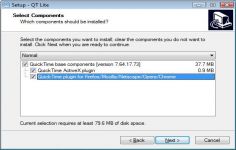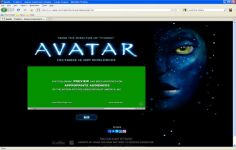 QuickTime Lite QuickTime Alternative 1.61
QuickTime Lite QuickTime Alternative 1.61
MySQL AB - (Freeware)
QuickTime Lite is a version of QuickTime that offers the possibility to play QuickTime content embedded in webpages.
QuickTime Lite, also called QuickTime Alternative, is an alternative to QuickTime and allows to read. Mov files with the favorite player.
This application is very practical due to the fact that it offers the possibility to read QuickTime files using drives other than QuickTime Player. With the help of this program, users can view video streams with any QuickTime player.
The multimedia player used by the software can handle all formats QuickTime: mov, qt, 3gp, and many others.
The Media Player Classic is included in the package but is not essential reading, user can totally use its favorite video player. Plugins to play videos in Quicktime Internet Explorer, Mozilla or Opera are also included.
- Title:
- QuickTime Lite QuickTime Alternative 1.61
- File Size:
- 10.6 MB
- Requirements:
- Windows 2000 / XP / Vista / Windows7 / XP64 / Vista64 / Windows7 64 / Windows8 / Windows8 64
- Language:
- en-us
- License:
- Freeware
- Date Added:
- 08 Sep 2005
- Publisher:
- MySQL AB
- Homepage:
- http://www.mysql.com
- MD5 Checksum:
- Not calculated
# Bugs Fixed
* InnoDB Storage Engine: The “random read-ahead†feature that was removed from the InnoDB Plugin is now available again. Because it is only helpful for certain workloads, it is turned off by default. To turn it on, enable the innodb_random_read_ahead configuration option. Because this feature can improve performance in some cases and reduce performance in others, before relying on this setting, benchmark both with and without the setting enabled.
* The metadata locking subsystem added too much overhead for INFORMATION_SCHEMA queries that were processed by opening only .frm or .TRG files and had to scan many tables. For example, SELECT COUNT(*) FROM INFORMATION_SCHEMA.TRIGGERS was affected.
* Compilation failed on Mac OS X 10.7 (Lion) with a warning: Implicit declaration of function 'pthread_init'
* With profiling disabled or not compiled in, set_thd_proc_info() unnecessarily checked file name lengths.
* A DBUG_ASSERT added by Bug #11792200 was overly aggressive in raising assertions.
* CHECK TABLE and REPAIR TABLE failed to find problems with MERGE tables that had underlying tables missing or with the wrong storage engine. Issues were reported only for the first underlying table.
* Replication: Processing of corrupted table map events could cause the server to crash. This was especially likely if the events mapped different tables to the same identifier, such as could happen due to Bug#56226. Now, before applying a table map event, the server checks whether the table has already been mapped with different settings, and if so, an error is raised and the slave SQL thread stops. If it has been mapped with the same settings, or if the table is set to be ignored by filtering rules, there is no change in behavior: the event is skipped and IDs are not checked.
* For a lower_case_table_names value of 1 or 2 and a database having a mixed-case name, calling a stored function using a fully qualified name including the database name failed.
* Previously, Performance Schema table columns that held byte counts were BIGINT UNSIGNED. These were changed to BIGINT (signed). This makes it easier to perform calculations that compute differences between columns.
* The embedded server crashed when argc = 0.
* The mysql_affected_rows() C API function returned 3 (instead of 2) for INSERT ... ON DUPLICATE KEY UPDATE statements where there was a duplicated key value.
* Upgrades using an RPM package recreated the test database, which is undesirable when the DBA had removed it.
Related software
2.6/5 from 106 users

